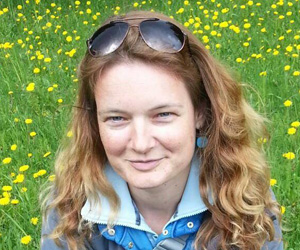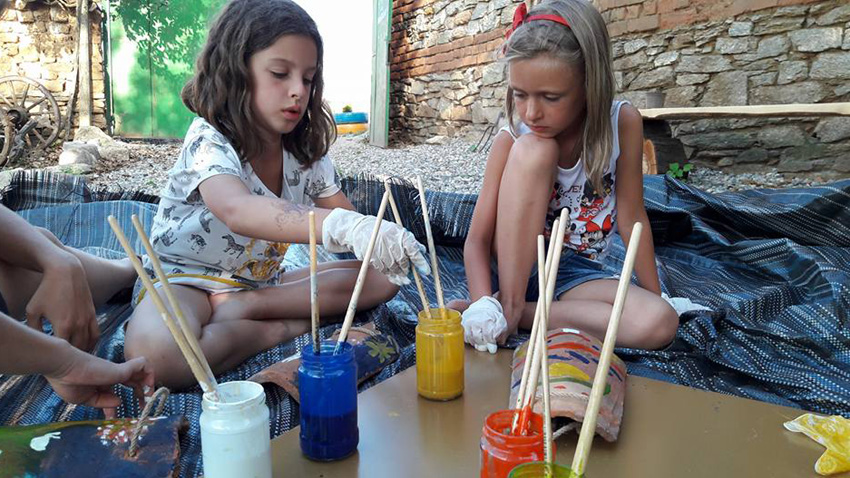Children have a special gift-they feel themselves into fairy tales to such extent that later they reproduce them in games. However, it turned out that they do not have to resort to their imagination, in order to enter a completely new world. Rural idyll with its sounds, colors and scents can offer urban children a wonderful trip in time and space.
A solar farm recently opened doors in the Rhodope village of Tankovo. It is a magical place where children can do many things and above all - feel free.
 “I decided to open the solar farm for visitors, in order to show children and young people how rural people live, how food is produced, why it is important to eat natural, organic and clean products, how people who live in the Bulgarian villages are inextricably bound up with nature and why we must preserve nature”, the owner of the solar farm Mihaela Kircheva told Radio Bulgaria.
“I decided to open the solar farm for visitors, in order to show children and young people how rural people live, how food is produced, why it is important to eat natural, organic and clean products, how people who live in the Bulgarian villages are inextricably bound up with nature and why we must preserve nature”, the owner of the solar farm Mihaela Kircheva told Radio Bulgaria.
Mihaela Kircheva talks with inspiration about her dream which came true. She built a solar farm, because her project won the Rinkers' Challenge 2016 competition. Thus, Mihaela received a small subsidy. On June 11 her farm welcomed its first visitors - children from the city of Kardzhali (Southeast Bulgaria) who went there on an excursion.
“Children love our animals - they enjoy spending time with the rabbits, the hens, the chickens, the donkey and the horse, Mihaela Kircheva went on to say. There is also a bee-garden in our village and we show children how honey is produced. Besides, children like to draw on roof tiles, to make figures out of mud and straw. We also organize competitions, where children use forest materials and draw with leafs, stones and straw. In other words, our approach is very creative and we are trying to use everything that surrounds us in our games.”

Children find themselves in a forgotten world when crossing the threshold of the solar farm. They can see in the farm a churn-dash, a maize-sheller, gas lamps, reaping hooks, clay pots, parti-colored rugs and other items typical of the rural Bulgarian lifestyle. A loom will be brought to the farm soon. Thus, Mihaela will be able to show visitors how people used to weave motley rugs in the past.
“People can't see any cars here, because the main road is above the solar farm. The farm is surrounded by trees, grass, rocks and animals, which allow children to sink into the natural environment. For instance, two girls from our last children's camp always walked barefooted. Apparently children relax and feel good here.”
Mihaela Kircheva has travelled a lot across Bulgaria and abroad, because she used to work in the tourism field for fifteen whole years. However, she made the wisest decision and chose rural life.
“I chose to live in that village, because I like peace and quiet. I also like to produce my own food and I know what I put on my table and what I feed my children with. Thus, I am confident and sure that I guarantee a high-quality life to my kids. One day they will decide where to live themselves”, Mihaela Kircheva went on to say.
On August 12 the solar farm launched doors open day, in order to show people from the village of Tankovo, its guests and friends its small world. I hope to encourage other people to join that initiative, because when people support a given farm they actually support the Bulgarian village, Mihaela Kircheva said and promised to organize an ornithological tour in the vicinity of the village of Tankovo, where visitors can enjoy a bird concert.
English version: Kostadin Atanasov
The village of Hotantsa, near the Danube city of Ruse, is hosting the Hotantsa Sarma Festival , a celebration of Bulgaria’s culinary and folk heritage. Organised by the local cultural and community centre ( chitalishte ) Svetlina-1928 , the festival..
He does not accept the definition of "apostle" or "missionary", although for many he is exactly that - a messenger of God in the world, proclaiming His Word. He first became a priest in his native Vidin diocese, in Northwestern..
Over 80% of Bulgarians are expected to start using artificial intelligence in the next three years , across all age groups. Today, it is almost impossible to find a Bulgarian student who does not turn to ChatGPT when preparing homework. This..
The village of Hotantsa, near the Danube city of Ruse, is hosting the Hotantsa Sarma Festival , a celebration of Bulgaria’s culinary and folk heritage...
He does not accept the definition of "apostle" or "missionary", although for many he is exactly that - a messenger of God in the world,..

+359 2 9336 661
